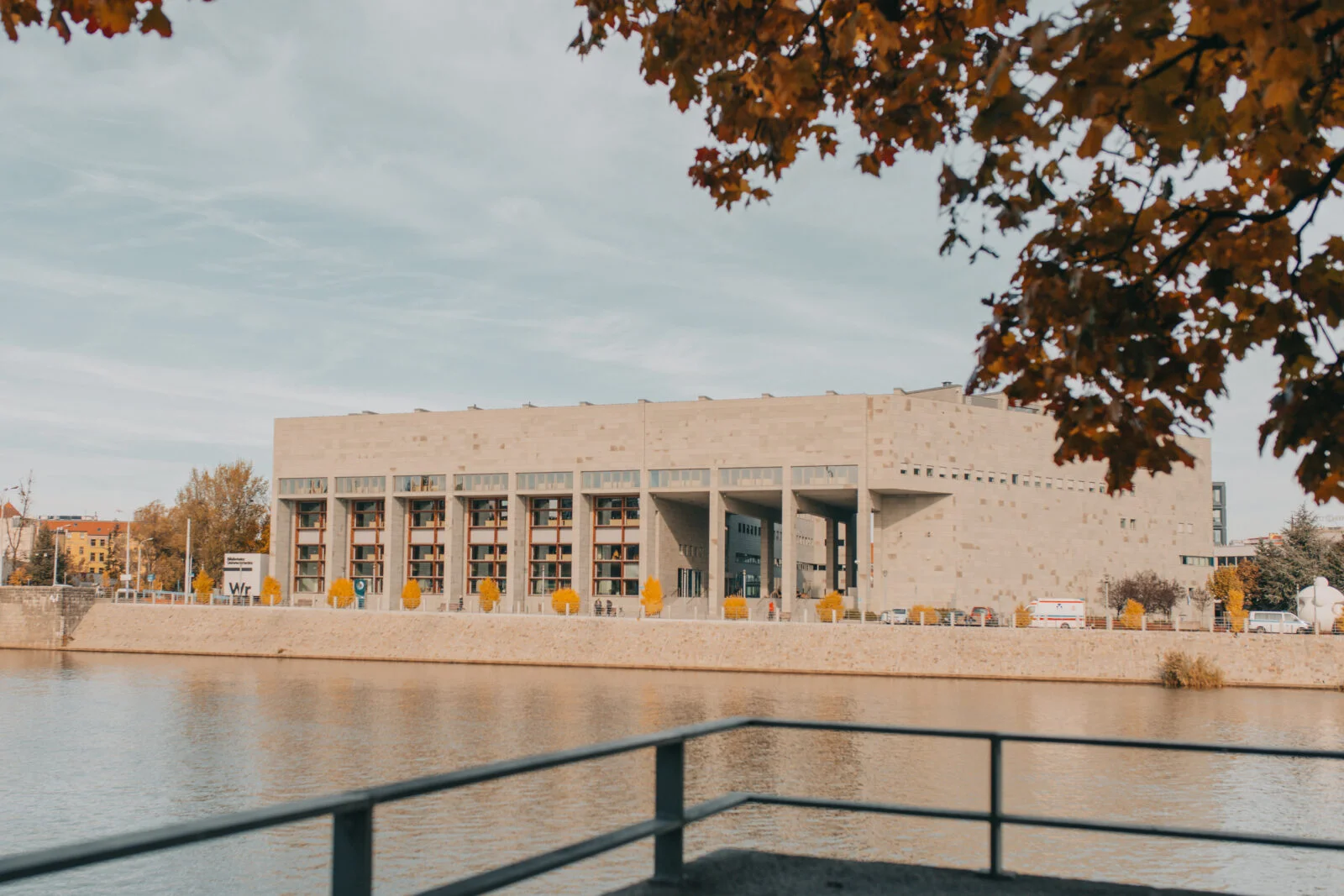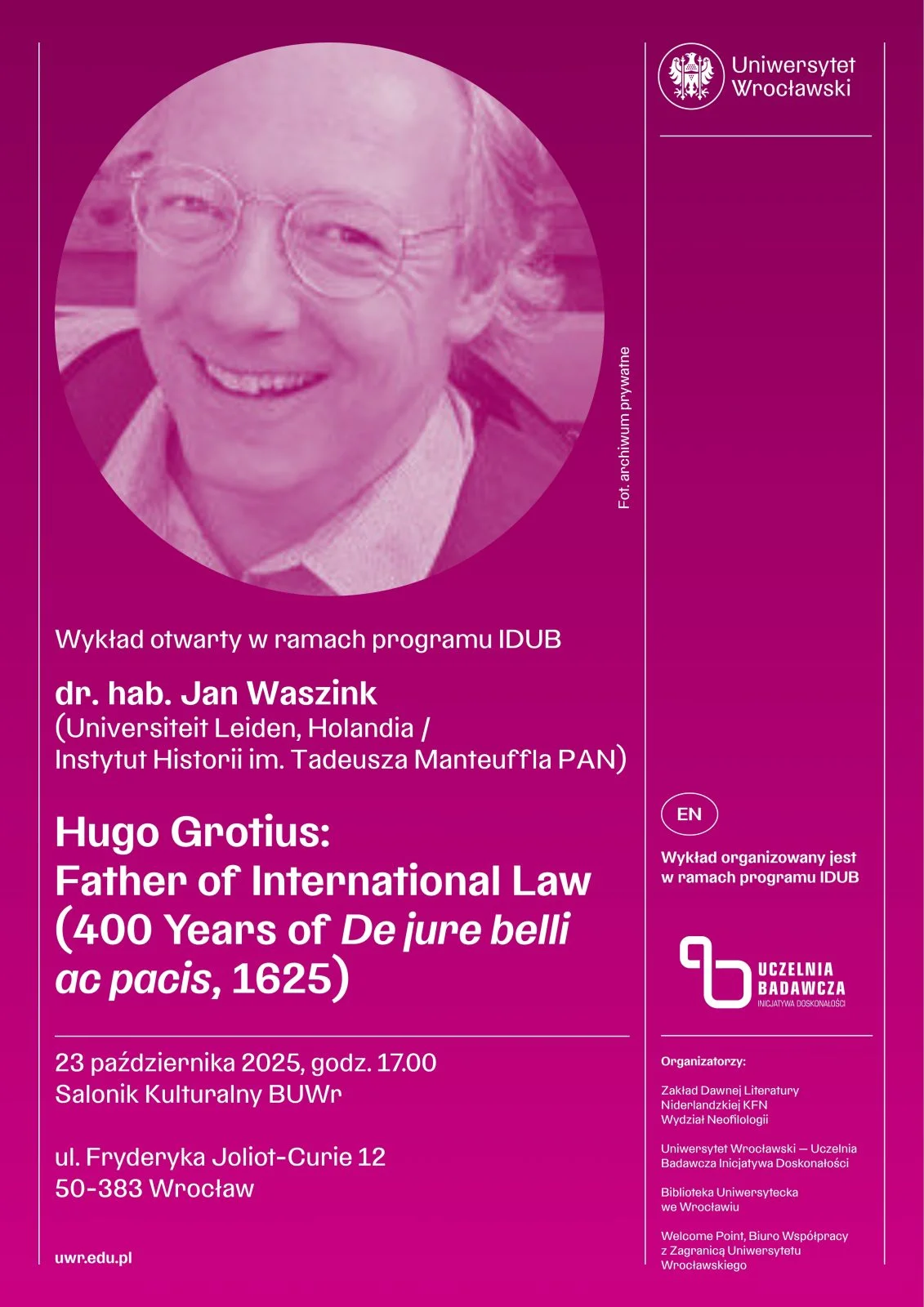
Wykład prof. Jana Waszinka w Bibliotece Uniwersyteckiej
Zakład Dawnej Literatury Niderlandzkiej Katedry Filologii Niderlandzkiej Uniwersytetu Wrocławskiego, pod kierunkiem prof. Stefana Kiedronia, serdecznie zaprasza na wykład dr. hab. Jana Waszinka (Universiteit Leiden, Holandia / Instytut Historii im. Tadeusza Manteuffla PAN). Wykład pt. „Hugo Grotius: Father of International Law (400 Years of De jure belli ac pacis, 1625)” odbędzie się 23 października 2025 r. o godz. 17:00 w Saloniku Kulturalnym Biblioteki Uniwersyteckiej we Wrocławiu (ul. Fryderyka Joliot-Curie 12, 50-383 Wrocław). Wydarzenie odbywa się w ramach programu „profesorów wizytujących” IDUB.
Biogram
Dr hab. Jan Waszink (doktorat: Universiteit van Amsterdam, 2002, habilitacja: Instytut Historii im. Tadeusza Manteuffla PAN, Warszawa, 2024) to jeden z najwybitniejszych znawców myśli politycznej i filozoficznej Hugona Grocjusza (Hugo Grotius, 1583-1645), twórcy zasad prawa międzynarodowego. Jako neolatynista Jan Waszink opublikował liczne artykuły poświęcone kulturze klasycznej XVI- i XVII-wiecznych Niderlandów, w tym polityce, dyplomacji i poezji Złotego Wieku. Swoją dysertację, której promotorem był wybitny neolatynista niderlandzki prof. Christiaan Lambert Heesakkers, zatytułowaną The Politica of Justus Lipsius. Introduction, Edition, Translation, poświęcił teoriom politycznym wybitnego filozofa, twórcy teorii neostoicyzmu Justusa Lipsiusa (1547-1606).
Jan Waszink jest założycielem i redaktorem naczelnym serii Bibliotheca Latinitatis Novae (Leuven University Press, Belgia), w której opublikował m.in. naukowe tłumaczenie, wraz z komentarzami: Hugo Grotius, Annals of the War in the Low Countries. Edition, Translation and Introduction by J. Waszink, Leuven UP 2023, będące podstawą jego habilitacji . Był kierownikiem i/lub uczestnikiem międzynarodowych projektów naukowych, w tym holenderskiego grantu Nederlands Fonds voor Wetenschappelijk Onderzoek, NWO-VENI, Radboud Universiteit Nijmegen – projekt The Annales and Historiae by Hugo Grotius; projektu Mapping the Latin Enlightenment, University of Western Australia at Perth; a także projektu NCN Opus: Secularisation of the West: Tacitism from 16th-18th centuries. Jego liczba cytowań (stan na rok 2023): z oddzielnym uwzględnieniem autocytowań: 289 (Google Scholar) oraz 1165 (Academia.edu); indeks Hirscha: 9.
O wykładzie
In 1625, 400 years ago, the child prodigy (with 11 years a student in Leiden, with 15 years dr. juris) and later a famous author of works about political theory and law, Hugo Grotius (1583-1645), published the famous work De jure belli ac pacis (On the Law of War and Peace, Paris 1625). This work had, for the first time, clearly formulated the general rules on ocean waters; therefore Grotius was called “the father of international law”. His first attempt to this was Mare Liberum (The Free Sea, Leiden 1609), where he argued that the Portuguese and the Spanish were not the only nations “to rule” over world’s seas. From now on the Dutch, fighting against the Spanish imperium, had broken its monopoly position. This was the beginning of the Dutch Golden Age.
The Wrocław University Library is a perfect venue for this lecture, as here (in the Old Prints Department) a magnificent collection of books from the 16th and 17th century is to be found (more than 300.000 works; one of the biggest collections in Europe); among them also works of Grotius, even with a dedication of his own hand.

Data publikacji: 15.10.2025
Dodane przez: M.K.



